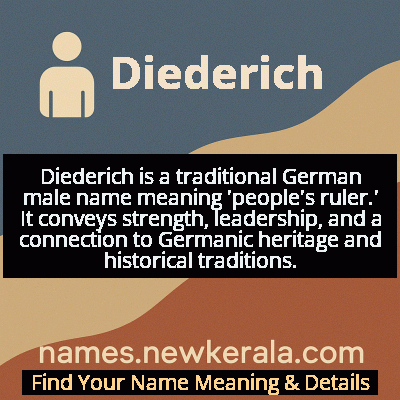Diederich Name Meaning & Details
Origin, Popularity, Numerology Analysis & Name Meaning of Diederich
Discover the origin, meaning, and cultural significance of the name DIEDERICH. Delve into its historical roots and explore the lasting impact it has had on communities and traditions.
Name
Diederich
Gender
Male
Origin
German
Lucky Number
2
Meaning of the Name - Diederich
Diederich is a traditional German male name meaning 'people's ruler.' It conveys strength, leadership, and a connection to Germanic heritage and historical traditions.
Diederich - Complete Numerology Analysis
Your Numerology Number
Based on Pythagorean Numerology System
Ruling Planet
Moon
Positive Nature
Diplomatic, friendly, artistic, empathetic.
Negative Traits
Over-sensitive, moody, indecisive, prone to self-pity.
Lucky Colours
Green, cream, white.
Lucky Days
Monday.
Lucky Stones
Pearl, moonstone.
Harmony Numbers
1, 3, 4.
Best Suited Professions
Diplomats, mediators, caregivers, artists.
What People Like About You
Cooperative spirit, friendliness, artistic talent.
Famous People Named Diederich
Diederich Kessler
Businessman
Founder and CEO of Cambridge Quantum Computing
Diederich von dem Werder
Poet and Translator
Translated Italian epic poetry into German and wrote original baroque poetry
Diederich Hahn
Politician
German conservative politician and member of the Reichstag
Diederich Westermann
Linguist and Ethnologist
Pioneering researcher of African languages and cultures
Name Variations & International Equivalents
Click on blue names to explore their detailed meanings. Gray names with will be available soon.
Cultural & Historical Significance
In literature, the name gained particular prominence through Heinrich Mann's 1918 novel 'Der Untertan' (The Loyal Subject), whose protagonist Diederich Hessling became an archetype of authoritarian personality in German society. The name carries connotations of Germanic heritage, traditional authority, and a connection to medieval European history, making it a name that evokes both historical weight and cultural identity. It represents a bridge between ancient Germanic traditions and modern German cultural consciousness.
Extended Personality Analysis
Individuals named Diederich are often perceived as strong-willed, authoritative, and principled. They tend to exhibit natural leadership qualities, with a firm sense of responsibility and dedication to their goals. The historical weight of the name suggests someone who is reliable, traditional in values, and capable of making difficult decisions when necessary. These individuals often demonstrate perseverance and determination, showing resilience in the face of challenges.
They may be seen as somewhat serious or formal, but this often masks a deep commitment to their principles and those they care about. The name's association with rulership and governance suggests someone who is organized, strategic in thinking, and capable of taking charge in complex situations. While they may not be the most emotionally expressive, their loyalty and reliability make them valued in both professional and personal relationships. The name carries an expectation of integrity and steadfastness that often influences how bearers of the name develop their character.
Modern Usage & Popularity
In contemporary times, Diederich is considered a traditional and somewhat rare German name. While it never reached the peak popularity of more common German names, it maintains a steady, though limited, usage primarily in Germany and among German-speaking communities. The name is often chosen by parents seeking a strong, historically significant name that reflects German heritage and traditional values. In recent decades, its usage has declined in favor of more modern or international names, but it continues to be used by families who appreciate its classical roots and authoritative sound. The name is particularly popular among families with strong connections to German history or those seeking to honor family traditions. Its rarity in modern times gives it a distinctive quality while maintaining its cultural authenticity.
Symbolic & Spiritual Meanings
Symbolically, Diederich represents authority, tradition, and Germanic heritage. The name carries connotations of leadership and governance, reflecting its meaning as 'people's ruler.' It symbolizes strength of character, reliability, and a connection to historical roots and cultural identity. Metaphorically, the name suggests someone who bridges past and present, carrying forward traditional values while navigating contemporary challenges. It represents the archetype of the responsible leader who serves their community with integrity and dedication. The name also symbolizes cultural continuity and the preservation of heritage, making it meaningful for those who value their Germanic ancestry and historical connections. In a broader sense, Diederich embodies the qualities of steadfastness, principled leadership, and cultural pride that have characterized Germanic societies throughout history.

